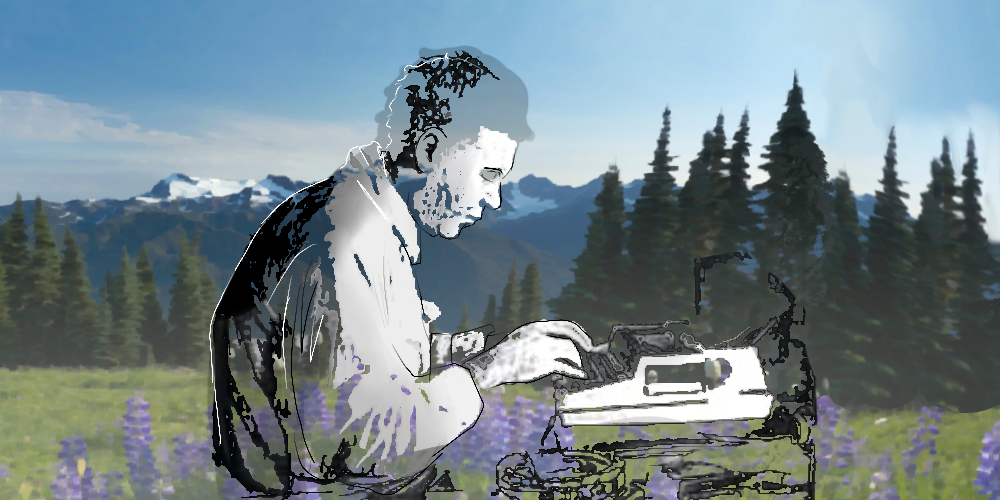I make it a point to try and visit the graves of writers once I get to the age they were when they died. But I made an exception for you, Raymond Carver. After all, I was still months shy of my 50th birthday when I went to see you. We were in Port Angeles, and besides, my wife encouraged me to do it. Normally, she’d tell me I couldn’t claim to be 50 until my birthday, but she also made an exception for you. Maybe it was because she knew that 50 had always been my number too. The number of years I figured I had here on Earth — if I was lucky. I’d been shooting for it for a while and I was close enough. Or perhaps it was because you’d also known “the love of a good woman” those “last ten years” of your life, or because you’d been sober, or it could have been just because she knew how much you’d meant to me, that you and I had been through a lot together and she’d been right by my side (thank god) for all of it. Yes. Thank God for that, and thank God for her.
Years ago, just after we were married, the two of us drove out into the Nevada desert together and found a large rock to sit on just after the sun had risen into the blue western skies. We kissed, and I read her “Cathedral” while she rested her head in my lap. It was “really something” as you had said. Your story, I mean, and this life too. There were times when I wasn’t sure I’d be able to say that and mean it, but I felt it that day, and I feel it now. From that day forward, I’d pretty much stuffed one of your books in my backpack wherever I went. It was like an accessory, an essential accessory. Maybe even more than that. It was almost a necessity since I pulled it out in hospitals or on airplane rides when we’d hit some turbulence. Before a doctor would bring the results . . . and after.
So, when we finally made it to your grave, I was glad to see you’d left a bench for us to sit on. Maybe because you knew that I’d be out of breath by the time I got there. Or perhaps you’d placed it there in the event I’d wanted to sit down and have a smoke. Who knows. But I was glad you left a bench there, I can tell you that. I made myself at home, lifted the bill of my cap, and wiped my brow.
She was right beside me, and we sat on the bench together and looked out at the ice-blue waters of the strait, with the Olympic Mountains peering over our shoulders. Still, you’d made sure it wasn’t too pristine. That wouldn’t have been your style, and you picked a spot where they’d forget to cut the grass or water it for long stretches of time. Where the weeds would grow longer than they should have and the sun would only shine for select periods of the year. It wasn’t perfect, or maybe it was, but it was paradise — or close enough — and I imagine you knew it.
Even so, I wasn’t quite sure what to do after I’d sat down. So I read you some of your poems aloud, which might have seemed strange. But I certainly wasn’t going to read mine to you, at least not there. And I figured you might enjoy hearing someone else read the words you’d written, the words you’d lived. Maybe that would be easier than reading them yourself. I’m not sure, but I read them anyway. Forgive any mistakes I might have made. You’d think I would have been flawless by now, but it was more intimidating in your presence than I had imagined, though I am sure you would have put me at ease if you could have. When I was done, my wife wondered aloud if there might be a plot available for us there one day. The view was breathtaking, and she liked the way you and Tess had planned for you to be there together even though she had yet to join you.
Then we walked around the cemetery a little and read some other names and came back to the bench and then walked around some more. After that, we went into town and ate lunch across from the Ferry Terminal. Maybe you’d eaten there too. Although I still had six months before I’d turn 50, I had to wave the white flag and accept I wasn’t going to accomplish what you had in your 50 years. This wasn’t a new revelation, but seeing the dates on your grave reminded me. But that was ok. That was more than ok. After all, none of us want to surpass our idols or even get particularly close to them. Not really, anyway. We want them to remain just where they’ve always been, at some unattainable point in the distance, their words carrying us forward — through the darkness and time. And you were there. You were still there. Thank god for that. And I’d always be able to find you, out there on the horizon, just where I knew you’d be. Someday, with any luck, maybe you’d see me coming and wave me in, call me to shore and say, “Over here!” I’d smile and shake my head, surprised that you were awaiting my arrival and that you knew exactly where I’d be calling from.•




